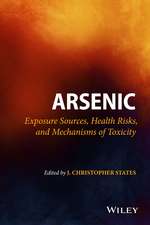Nutrition: Pre- and Postnatal Development: Human Nutrition
Editat de M. Winicken Limba Engleză Paperback – 21 iul 2012
Preț: 732.01 lei
Preț vechi: 770.53 lei
-5% Nou
Puncte Express: 1098
Preț estimativ în valută:
140.09€ • 145.71$ • 115.65£
140.09€ • 145.71$ • 115.65£
Carte tipărită la comandă
Livrare economică 14-28 aprilie
Preluare comenzi: 021 569.72.76
Specificații
ISBN-13: 9781461572121
ISBN-10: 1461572126
Pagini: 520
Ilustrații: XX, 496 p.
Dimensiuni: 170 x 244 x 27 mm
Greutate: 0.82 kg
Ediția:Softcover reprint of the original 1st ed. 1979
Editura: Springer Us
Colecția Springer
Seria Human Nutrition
Locul publicării:New York, NY, United States
ISBN-10: 1461572126
Pagini: 520
Ilustrații: XX, 496 p.
Dimensiuni: 170 x 244 x 27 mm
Greutate: 0.82 kg
Ediția:Softcover reprint of the original 1st ed. 1979
Editura: Springer Us
Colecția Springer
Seria Human Nutrition
Locul publicării:New York, NY, United States
Public țintă
ResearchCuprins
1 Nutrition and Metabolic Development in Mammals.- 1. Introduction.- 2. Fetal Period.- 3. Perinatal Period.- 4. Suckling Period.- 5. Weaning Period.- 6. Permanent Effects of Early Nutritional Changes.- 7. Summary.- 8. References.- 9. Recommended Reading.- 2 Malnutrition and Mental Development.- 1. Introduction.- 2. Animal Studies.- 3. Human Studies.- 4. References.- 3 Nutrition and Cellular Growth.- 1. Introduction.- 2. Normal Cellular Growth.- 3. Effect of Diet on Cellular Growth.- 4. References.- 4 Nutrition and Brain Neurotransmitters.- 1. Introduction.- 2. Basic Neurobiology.- 3. Nutrition and the Brain.- 4. Implications of Precursor Control of Brain Neurotransmitter Synthesis and Release.- 5. References.- 5 Nutrition and Pregnancy.- 1. Maternal-Fetal Exchange.- 2. Nutrition and Growth of the Human Conceptus.- 3. Nutrition and Growth of the Conceptus in Animal Models.- 4. Effects of Specific Deficiencies on Fetal Growth.- 5. References.- 6 Early Infant Nutrition: Breast Feeding.- 1. Introduction.- 2. Fetus.- 3. Exterogestate Fetus.- 4. Transitional Period.- 5. Conclusions.- 6. References.- 7 Early Infant Nutrition: Bottle Feeding.- 1. Introduction.- 2. Nutritional Requirements.- 3. Special Formulas.- 4. Feeding Regimens.- 5. Solid Feedings.- 6. Summary.- 7. References.- 8 Malnutrition, Learning, and Animal Models of Cognition.- 1. Introduction.- 2. Techniques for Producing Early Malnutrition in Animals.- 3. Behavior Effects of Malnutrition in the Young Animal.- 4. Learning and Motivation.- 5. Concurrent Effects of Protein and Calorie Malnutrition on Stimulus-Response Learning.- 6. Concurrent Effects of Protein Malnutrition on Complex Stimulus-Response Learning.- 7. Long-Term Effects of Early Malnutrition on Simple Stimulus-Response Learning Following Rehabilitation.- 8. Long-Term Effects of Early Malnutrition on Hebb-Williams Maze Learning.- 9. Long-Term Effects of Early Malnutrition on Emotional Reactivity..- 10. Malnutrition and Functional Isolation.- 11. Mechanisms Through Which Malnutrition May Produce ‘‘Functional Isolation”.- 12. Implications of an Animal Model for Human Cognitive Development.- 13. References.- 9 Nutrition and Mental Development in Children.- 1. Introduction.- 2. The INCAP Study.- 3. Results.- 4. Discussion.- 5. References.- 10 Malnutrition and Infection.- 1. Introduction.- 2. Perspective from the Developing Nations.- 3. Perspective from the Industrialized Nations.- 4. Effects of Infection on Nutritional Status.- 5. Effects of Malnutrition on Susceptibility and Response to Infection...- 6. Iron Deficiency.- 7. Vitamin A Deficiency.- 8. Diarrheal Disease.- 9. Vaccination in Malnutrition.- 10. References.- 11 Nutrition in Dental Development and Disease.- 1. Introduction.- 2. Amelogenesis and Chronology of Human Teeth Eruption.- 3. Dental Dysiplasias and Malnutrition.- 4. Protein-Calorie Malnutrition and Dental Caries.- 5. Conclusions.- 6. References.- 12 Pediatric Nutrition: Potential Relationship to the Development of Atherosclerosis.- 1. Introduction.- 2. Anatomic Studies: Pediatric Precursors of Mature Atherosclerotic Lesions.- 3. Distribution of Serum Lipids in Children.- 4. Childhood Diet and Serum Lipids.- 5. Neonatal and Infantile Cholesterol Levels and Their Relationship to Diet.- 6. Longitudinal Effects of Infant Feeding on Plasma Cholesterol Levels.- 7. Nutritional Approaches to Treatment of Pediatric Familial Hyperlipoproteinemias.- 8. Obesity.- 9. Hypertension.- 10. Safety and Nutritional Adequacy of Fat- and Cholesterol-Modified Diets.- 11. Conclusion.- 12. References.- 13 Iron Deficiency:Behavior and Brain Biochemistry.- 1. Introduction.- 2. Basic Aspects of Iron Metabolism and the Physiology of Anemia.- 3. The Prevalence of Iron Deficiency.- 4. Developmental and Ecological Factors in the Impact of Nutritional and Other Insuhs on Cognition.- 5. Iron Deficiency and Behavior.- 6. Biochemical Substrates for Behavioral Derangements.- 7. Conclusion.- 8. References.- 14 Inborn Errors of Metabolism.- 1. Introduction.- 2. The Basic Formula.- 3. The Progression to More Normal Foods.- 4. Monitoring Treatment.- 5. The Team Approach.- 6. References.- 15 Nutritional In-Hospital Management of Chronic Diarrhea in Children.- 1. Introduction.- 2. Diagnosis.- 3. Nutritional Treatment.- 4. Intravenous Sugar Feeding.- 5. Artificial Oral Diets.- 6. Medium-Chain Triglyceride Formulas.- 7. Carbohydrate-Free Diets.- 8. Total Parenteral Nutrition (TPN).- 9. Summary.- 10. References.


















